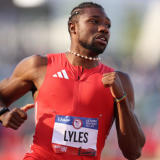For months leading up to the PyeongChang 2018 Winter Olympics, interest in the South Korea Games was reportedly "very low" because of global tensions involving North Korea, South Korea's infamous neighbor, but there were also hundreds of thousands of people who were prepared to boycott the Olympics altogether.
That's because, as was well publicized before both the 1988 Seoul Summer Olympics and the 2002 FIFA World Cup, South Korea permits the consumption of cat and dog meat -- foods that have a long history in the nation but are illegal to sell in the United States.
As they did in the months leading up to the Summer Games 30 years ago in Seoul, according to Vice, South Korea imposed restrictions on certain dog meat markets so as not to rub Olympics guests the wrong way. The changes came "after complaints from local residents about the noise and smell, but authorities (were) also eager to stave off any international controversy," Vice reported, adding that some markets would remain open, albeit without the "display of live dogs."
But not everyone was satisfied in the months before the Olympics, and there is still attention being given to meat markets located near current Winter Games venues.
Eating cat and dog has been commonplace in South Korea since as early as the 1300s, some research says, but more than 200,000 previously vowed to skip the 2018 Winter Games in a Change.org petition, which addressed the International Olympic Committee and called for a complete end to cat and dog meat consumption. More than a million others, meanwhile, had put their names on a separate petition to the President of the Republic of Korea to ban the trade of dog meat.
















